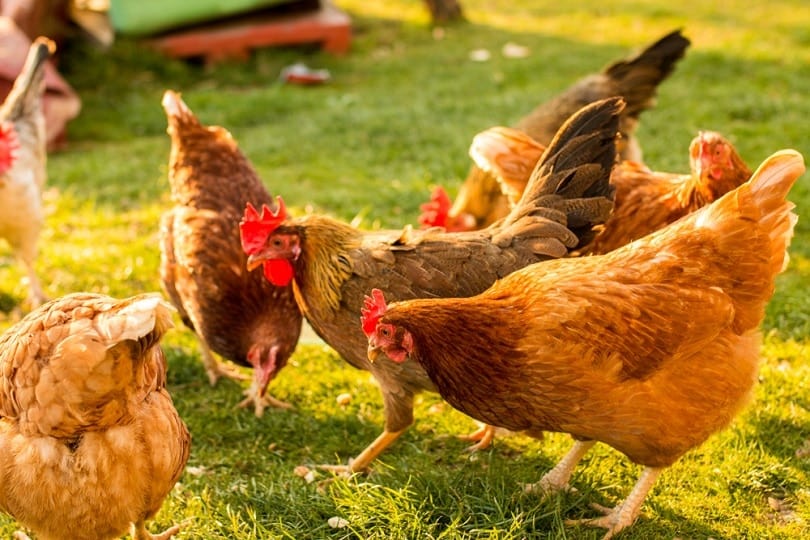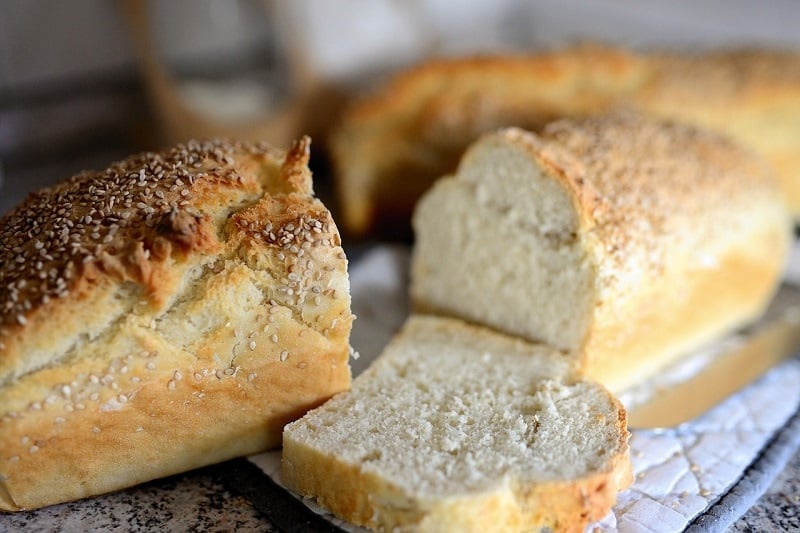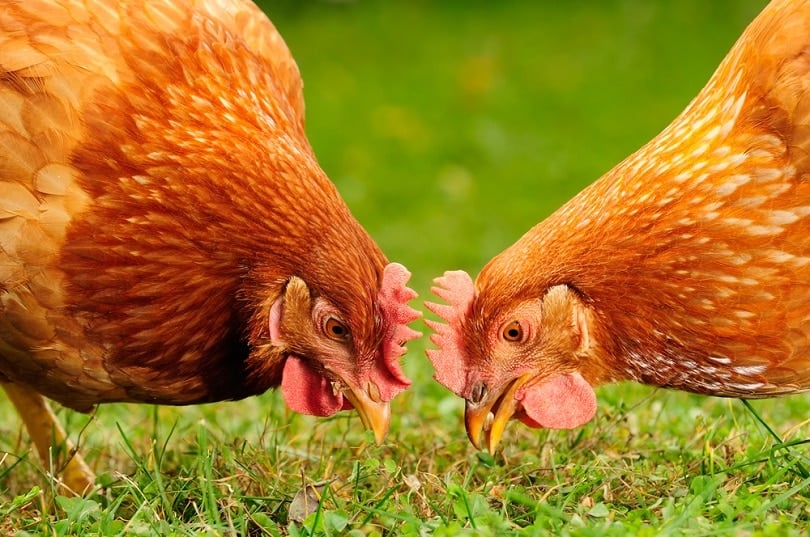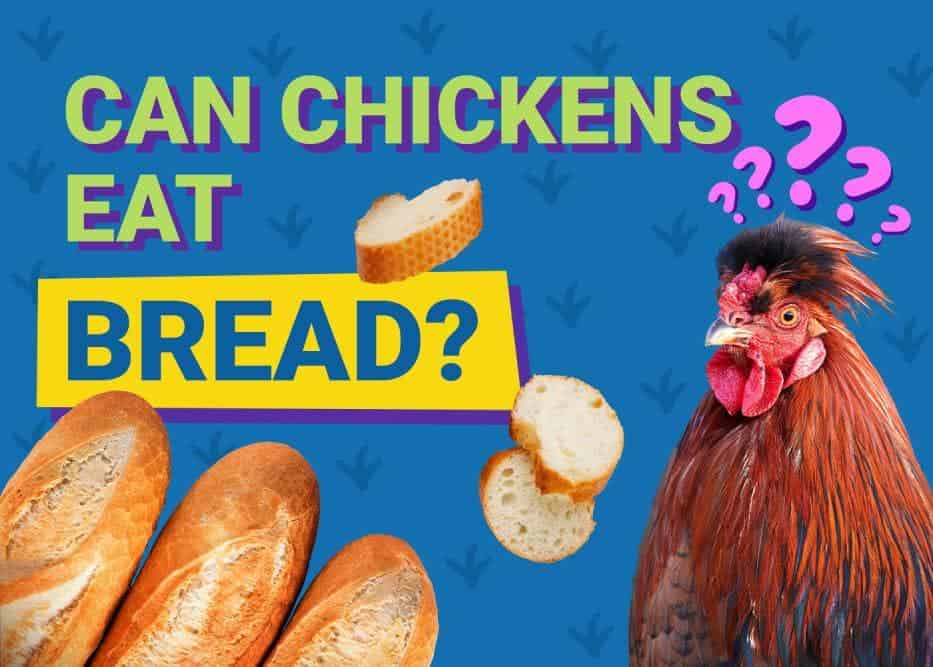Approved by Dr. Paola Cuevas
Bread is a typical food that most people innocently feed their chickens without knowing the side effects. While chickens love eating table scraps, and most of the leftovers are usually safe for them, bread is not.
That’s not to say that bread is poisonous and chicken shouldn’t eat it. The problem with this staple breakfast meal is that your chicken’s digestive system isn’t designed for this kind of food. Therefore, if you offer large amounts of bread—both organic and non-organic—to chickens, you risk harming them.
So, before you round up crusts from a piece of bread to offer your chickens, here are all the vital things you need to know about chickens and bread.

Why Chickens Should Not Eat Bread
1. Choking Hazard
Just as with other birds like ducks, chickens crave bread. If you offer them brown or seeded bread, the more they’ll love it. However, if you feed bread to your poultry, you risk it getting stuck in their throat and choking them.
Dry bread usually expands when in the mouth, and chickens do not have teeth to grind or cut their food, so it can get stuck in the throat if the chicken tries to eat a big piece. Besides the throat, bread can also block the crop, which is a storage sack at the beginning of the chicken’s digestive system. If your brood must have bread as a treat, it would be best if you wet the slice first.

2. Not Fit for Chicken Digestive Anatomy
Here’s how a chicken digests their food: They have a part known as a crop at the base of their necks, a region where food collects after eating.
The crop is like food’s waiting bay before it proceeds to digestion. But if chicken eats bread, a piece is big enough to fill up the crop, form a ball, and potentially cause a catastrophic blockage.
3. Deadly Fermentation In a Chicken’s Body
Bread contains yeast and sugar that can ferment in the crop, elevating the pH levels of the crop’s content. If the bread is too much, it changes the microbiome, such as the bacteria that grow in the fowl’s gizzard and crop. Unfortunately, these changes can trigger chronic cases of a sour crop, a yeast infection that is difficult to treat.
4. Low-Protein Food
Bread is a nutritionally void food in chickens, ducks, and other birds, so don’t gamble that your fowls would get any value from it. Chickens, especially chicks, require high protein diets for development.
While bread can be a treat for chickens, it lacks the protein content they need. This is because a typical slice of white bread consists of only 2–3 grams of protein, not nearly as much as these birds need to develop.

5. Poor Eggshell Quality
Apart from proteins, bread is also low in calcium, a nutrient responsible for egg quality. Feeding your chicken an exclusive bread diet or too much bread can cause them to feel full longer and reduce their layer mash consumption.
Hens need adequate calcium to produce good quality and strong eggshells. While offering bread for a few days may not pose a threat, long-term provision as a sole source of food may make the eggs brittle and break more easily than usual.
6. Mycotoxins in Moldy Bread
So, your bread has expired, and you think your fowl can benefit? While most poultry owners say that they do so without noticing adverse effects, avoid offering your chicken expired, moldy bread.
Moldy food can contain mycotoxins, which will affect your chickens’ immunity and health, increasing their stress and potentially even killing them. Mycotoxicosis can also lead to liver tissue degeneration, affecting the chicken’s ability to utilize proteins, which leads to low egg production. Similarly, exposing chicken to molds may cause breathing difficulties.
Other Foods Chickens Should Not Eat
- Processed Foods: Junk and greasy food are pretty bad for humans, but they are worse for chickens, as they are difficult to digest
- Avocado Skin and Pits: The skin, pit, and sometimes even the pulp or flesh of an avocado contain persin, a toxin that’s harmful to chickens.
- Coffee or Coffee Grounds: Chickens shouldn’t eat coffee or the grounds because they contain compounds known as caffeine and methylxanthine that are toxic to chickens.
- Chocolate: Chocolate is also toxic to chickens, as it contains poisonous caffeine and theobromine compounds.
- Green Potatoes and Tomatoes: Green potatoes and unripe tomatoes contain a poisonous chemical called solanine, like the one found in the nightshade plant family.
- Moldy or Spoiled Food: Offering chickens expired and moldy food isn’t a nice thing to do to your poultry. Such foods produce harmful toxins.
- Garlic, Onion, and Spicy Foods: These should not be offered to chickens, as they are toxic or simply irritating, thus not worth the risk.

What Chickens Can Eat
- Vegetables: Unless the veggie is part of the nightshade family, it is safe for your chicken and can be served raw or gently boiled. Safe vegetables include: cooked or shredded carrots, broccoli, spinach, squash, lettuce, kale, cabbage, cucumbers, chard, and pumpkins.
- Fruits: Apart from a few exceptions, fruits are safe and will provide your fowl with various vitamins and minerals. Suggestions include melons, apples, berries, and ripe tomatoes. Be sure to remove the apple and pear seeds.
- Grains: Rice, oats, wheat, and other similar grains are great for your brood.
- Corn: Chickens love corn, whether cooked or dried.
- Herbs: Herbs are great supplements to a chicken’s diet. There are different herbs, all providing their unique health benefits to fowls.
- Cooked Meats: You can provide meat to your chicken as long as it is well-cooked and chopped into small pieces.

Summary
As long as they are fresh and broken into small bits, a few bread scraps here and there will not kill your chickens, but they are also not the best treats. Now that you know how a chicken’s digestive system works, give the gizzard and crop a bit of help by not regularly offering bread to your brood.
Related reads:
